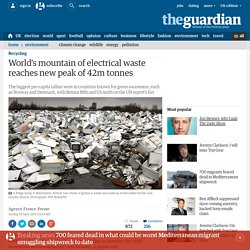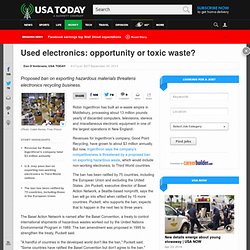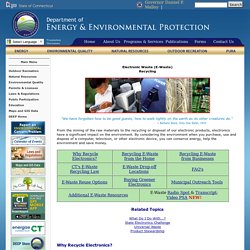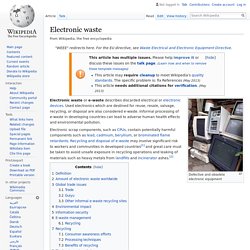

Arian
E-waste info. World's mountain of electrical waste reaches new peak of 42m tonnes. A record amount of electrical and electronic waste was discarded around the world in 2014, with the biggest per-capita tallies in countries that pride themselves on environmental consciousness, a report said.

Last year, 41.8m tonnes of so-called e-waste – mostly fridges, washing machines and other domestic appliances at the end of their life – was dumped, the UN report said. That’s the equivalent of 1.15m heavy trucks, forming a line 23,000km (14,300 miles) long, according to the report, compiled by the United Nations University, the UN’s educational and research branch. Less than one-sixth of all e-waste was properly recycled, it said. In 2013, the e-waste total was 39.8m tonnes – and on present trends, the 50-million-tonne mark could be reached in 2018.
Topping the list for per-capita waste last year was Norway, with 28.4kg (62.5lbs) per inhabitant. Used electronics: opportunity or toxic waste? Robin Ingenthron has built an e-waste empire in Middlebury, processing about 13 million pounds yearly of discarded computers, televisions, stereos and miscellaneous electronic equipment in one of the largest operations in New England.

Revenues for Ingenthron's company, Good Point Recycling, have grown to about $3 million annually. But now, Ingenthron says the company's competitiveness is threatened by a proposed ban on exporting hazardous waste, which would include non-working electronics, to Third World countries. The ban has been ratified by 75 countries, including the European Union and excluding the United States. Jim Puckett, executive director of Basel Action Network, a Seattle-based nonprofit, says the ban will go into effect when ratified by 15 more countries.
Puckett, who supports the ban, expects that to happen in the next two to three years. "A handful of countries in the developed world don't like the ban," Puckett said. No exemptions Fair trade for electronics. E-Waste - Connecticut. "We have forgotten how to be good guests, how to walk lightly on the earth as its other creatures do.

" ~ Barbara Ward, Only One Earth, 1972 From the mining of the raw materials to the recycling or disposal of our electronic products, electronics have a significant impact on the environment. By considering the environment when you purchase, use and dispose of a computer, television, or other electronic device, you can conserve energy, help the environment and save money. Electronic waste. Defective and obsolete electronic equipment Electronic waste or e-waste describes discarded electrical or electronic devices.

Used electronics which are destined for reuse, resale, salvage, recycling, or disposal are also considered e-waste. Informal processing of e-waste in developing countries can lead to adverse human health effects and environmental pollution. Electronic scrap components, such as CPUs, contain potentially harmful components such as lead, cadmium, beryllium, or brominated flame retardants. Recycling and disposal of e-waste may involve significant risk to workers and communities in developed countries[1] and great care must be taken to avoid unsafe exposure in recycling operations and leaking of materials such as heavy metals from landfills and incinerator ashes.[2] Definition[edit] Hoarding (left), disassembling (center) and collecting (right) electronic waste in Bengaluru, India Amount of electronic waste worldwide[edit] A fragment of discarded circuit board.
Trade[edit] Alex Lin - Turning E-Waste Into E-Treasure. Alex Lin was a boy who was just reading the newspaper one day.

He read an article about something called e-waste. He learned that it is the waste generated as people upgrade electronic devices. When people are done with things like computers, phones, mp3 players, etc. and throw them away, that’s e-waste. He also learned that e-waste is dangerous to the environment. Yet this was not something that was not widely known. To help stop e-waste, Alex got help from his community service group, the Westerly Innovations Network (WIN).
Additional Resources: Here is an article about Alex and his efforts.Here is an interview with Alex.Click here for more InspireMyKids stories about the environment.Find great books in our store, like Acting for Nature, about how children can help the environment.This video is about recycling e-waste.